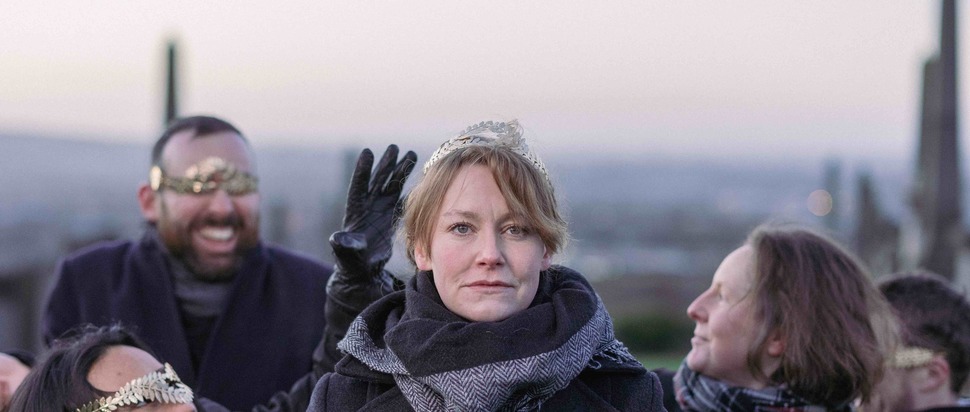Ewan Downie on Company of Wolves' Julius Caesar
We chat to Ewan Downie about mob mentality, laboratory theatre and directing Shakespeare in a different way
When it comes to Shakespeare, Julius Caesar is about as action-packed as it gets. Featuring a murderous conspiracy plot, political assassination, violent public retaliation and possibly one of the most quotable (and memeable) betrayals of all time (roughly translatable as 'really, Brutus?'), it's hard to imagine a more fast-paced plot. But the play is not regarded as one of Shakespeare's most exciting works. If anything, it's known for being a bit on the dense side – a rhetoric-heavy tragedy that takes a sombre approach to themes of politics, power and ethics.
But could this reputation be mainly down to how the play has been interpreted? Ewan Downie – Co-Artistic Director of Glasgow-based venture Company of Wolves – believes that when it comes to staging Julius Caesar, theatre practitioners have been missing a trick.
"I've seen a lot of productions [of Julius Caesar] and I've never seen any that I thought actually unearthed what's in the play," he admits, speaking to The Skinny about his adaptation of the tragedy, due to start touring Scotland in March. "Mostly it becomes this play about slow, serious men doing slow, serious things. People make Caesar's death this ponderous, important thing – but I think what's happening in that moment is almost giddy."
Downie makes a good point. The play – which starts with the rumblings of a conspiracy to kill Caesar, lest the Roman General becomes a tyrant – does have a fair amount of deliberation and discussion in it. But it's also characterised by a specific sort of irrationality; the kind of frenzy of righteousness that can lead people to utterly convince themselves of things without substantial evidence. In some ways, it's a sharp assessment of our instinctive, pack-like tendencies, shining a spotlight on how quickly we can be swayed by the emotional charge of a political moment.
"The people who are killing Caesar don't really think about the fact they are killing Caesar at all," says Downie. "They're really excited to be doing something they didn't think they would be able to do." He likens the frantic mood of the scene to something out of A Clockwork Orange and says that the crowd scene in the play, when the Roman public turn against the conspirators, has a similar, primal energy. "We are thinking of the crowd as like extreme Caesar fans," Downie explains. "Ones that can go from 'oh my god, I love him' to 'we have to kill that guy!'" The crowd is more like an "internet mob embodied as people'' than individual members of a collective group – something that Downie says makes the scene "much more frightening and actually quite recognisable."
Before co-founding Company of Wolves, Downie spent eight years immersed in the Polish laboratory theatre tradition. He says that the practice, most commonly associated with the experimental Grotowski method, is distinguished by a desire to "smash the whole thing up and make it into a concentrated dream version. Generally, people working in [lab theatre] don't care about the story of a play much." With one foot in this practise, and the other in the more traditional type of theatre that he saw at the Citizens Theatre growing up, Downie wanted to apply aspects of lab theatre to Julius Caesar while still telling the story. "[Lab theatre] involves trying to dig below a realistic portrayal, [to find out] what's underneath the play," he says. "You go into things like dream and nightmare and see what happens when you do that."
Applying this method to the process in the Julius Caesar rehearsal room proved revelatory. "It wasn't an idea I had in advance, but through working on the crowd scene... we realised that it is kind of a nightmare, and it isn't meant to make sense," Downie says. His training in laboratory theatre, which centres on tapping into human "irrationality, trance, madness", helped him figure out how to direct it. "If you look at these crowd scenes, they're kind of like music. Most of the crowds' responses have a kind of rhythmic structure to them," he reasons. "Shakespeare has the crowd speaking in unison a lot, but they say things that people wouldn't really be able to say in unison – long sentences of quite crazy stuff. As we started to play with that, that told me they needed to be much more extreme. They're sort of like a really frightening pantomime crowd that can flip against you or flip for you."
Mob mentality, pedestal-knocking and post-truth politics – thematically, there's a lot in Julius Caesar that rings true today. Downie agrees: "It's very much about a society in a moment of change, and the destabilising, very frightening moment where nobody's really sure of what the rules are anymore." He resisted the common decision to portray Caesar as a contemporary public figure, however. "There was a point when we were working on it when we asked, 'is Caesar Trump?'" he recalls. "But fairly quickly we rejected that idea. We don't tend to go, 'ah, we need to write things that comment on this present moment.' Because the present is always moving." By digging deeper, however, Company of Wolves may have tapped into the instinctive impulses in Julius Caesar that explain why politics so often plays out in the way it does. "The way we work," says Downie, a smile coming through from the other end of the telephone, "is by following our noses. We usually discover why our noses led us that way."
Julius Caesar tours Scotland, 17 Mar - 20 May
companyofwolves.org/projects/julius-caesar
